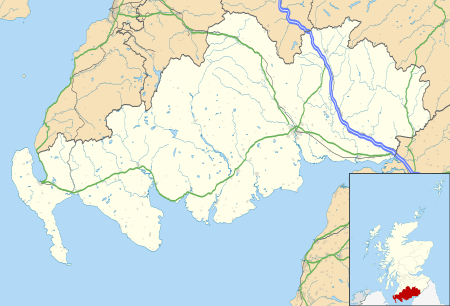Balmaclellan
| Balmaclellan | |
| Scottish Gaelic: Baile MhicIllFhaolain | |
 Balmaclellan |
|
 Balmaclellan |
|
| Council area | Dumfries and Galloway |
|---|---|
| Lieutenancy area | Dumfries |
| Country | Scotland |
| Sovereign state | United Kingdom |
| Police | Scottish |
| Fire | Scottish |
| Ambulance | Scottish |
| EU Parliament | Scotland |
| UK Parliament | Dumfries and Galloway |
| Scottish Parliament | Galloway and West Dumfries |
Coordinates: 55°05′16″N 4°06′46″W / 55.087778°N 4.112778°W
Balmaclellan (Scottish Gaelic: Baile MhicIllFhaolain, meaning town of the MacLellans) is a small hillside village of stone houses with slate roofs in a fold of the Galloway hills in south-west Scotland. To the west, across the Ken River, the larger and more prosperous New Galloway lies below the Rhinns of Kells.
Location and people
Balmaclellan is one of four parishes in the northern district of the Stewartry of Kirkcudbright. It contains 23,737 acres (96.1 km2), of which about 4,000 acres (16 km2) are cultivated. It includes areas of water, extensive plains of moss and about 300 acres (1.2 km2) of tree plantation, but most of the land is used for sheep or cattle pasture. Many of the cattle are of the Galloway breed.[1] The climate is temperate. Average monthly temperatures range from 1 to 7 C° in January, and 11 to 18 °C in July–August, with 984 mm of rain yearly.[2]
In 1887, John Bartholomew's "Gazetteer of the British Isles" Described the inhabitants as "... of a mixed Gaelic and Germanic origin, and speak Braid Scots, a Northumbrian dialect of English. Those that profess a religion are generally but by no means entirely Calvinist Christians, adhering to the Church of Scotland or the Wee Frees".[3] In 2009, of those who profess a religion in Balmaclellan most are Presbyterians adhering to the Church of Scotland.
The population was 554 in 1801, 634 in 1901 and 550 in 1951.[3]
History
Celtic relics have been found in the area, including a finely decorated mirror and crescent of the Bronze Age that is now in the National Museum of Scotland. The parish of Balmaclellan appears to have had an earlier British name, Treuercarcou, which appears in a thirteenth-century record of ecclesiastical taxes. The treu- part of this name is clearly the old northern British equivalent of modern Welsh tref, 'farmstead, dwelling', indicating an early settlement when this P-Celtic language was still spoken in the area.
The upper village has a 12th-century motte: the "Bal" of Balmaclellan. Barscobe Castle is just over a mile to the northeast, built in 1648 by William Maclellan, a fine example of the last phase of tower house building in Scotland.[4]
Balmaclellan was once a centre of the Covenanter religious movement. The village has a statue to Robert Paterson, Sir Walter Scott's 'Old Mortality'. His wife established a school in the village, which can still be seen. She is buried in the churchyard. Amongst other gravestones is that of another Covenanter, Robert Grierson, who was killed for his faith in 1685 (not to be confused with Sir Robert Grierson a notorious persecutor of the Galloway Covenanters).[5]
The churchyard also contains what is probably the earliest civic war memorial in Scotland. It commemorates five men from Balmaclellan who died in the Crimean War. A sixth man, an officer who died at Sebastopol, is commemorated on gravestone but not the memorial.
Near the edge of the Balmaclellan churchyard there is a rough uninscribed whinstone pillar that looks like an ancient monument, and is locally said to mark the grave of a witch.[6] Possibly the grave is that of Elspeth McEwen from nearby Dalry , who was found guilty of being a witch on her own confession and on the evidence of witnesses, and burned to death at Kirkcudbright in 1698. She was one of the last witches to be killed in Scotland.[7]
Literary References
The Scots comedy, Torwatletie (1940), by playwright Robert McLellan, set during the Jacobite rising of 1715, depicts the household of a nominally fictional Laird of the district.
References
External links
| Wikimedia Commons has media related to Balmaclellan. |